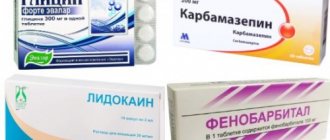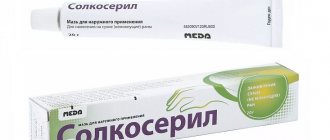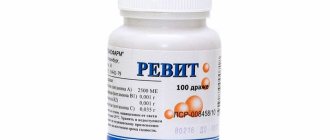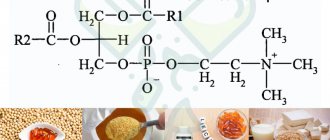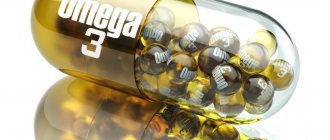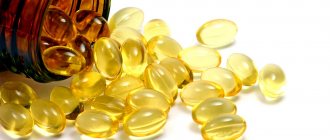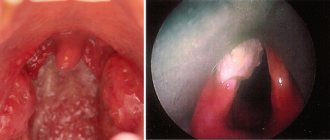A nootropic drug that helps restore metabolic processes in brain tissue - Pantogam. The drug has its own characteristics due to its composition.
It is similar to B vitamins, but at the same time has all the properties of nootropics.
Pantogam contains the main component - calcium hopantenate, which improves brain function. Its main property is to increase the brain’s resistance to hypoxia and the effects of toxins.
The drug has anticonvulsant and sedative properties, has a beneficial effect on the patient’s mental work and memory. Increases performance and muscle tone of the gallbladder and bladder. Relieves alcohol intoxication in chronic alcoholism.
Pharmacological properties and composition
Pantogam increases anabolic processes in neurons and reduces motor excitability. The specific effect of the drug is associated with its neurometabolic, neuroprotective and neurotrophic manifestations. It is low-toxic and does not cause allergic reactions.
It has sedative and stimulating properties on mental abilities and performance. Improves blood circulation in the brain and enhances energy processes.
The drug is well absorbed from the gastrointestinal tract and penetrates the BBB. Most of it is concentrated in the kidneys, liver, stomach walls and skin. It comes out unchanged after two days. It is excreted from the body in urine, and a small part of what is taken in feces.
Pantogam is produced in the form of syrup for children, tablets and capsules. The syrup is colorless or slightly yellowish in color, with a cherry smell. Active ingredients of the drug
- main
– calcium salt of hopantenic acid; - auxiliary
- glycerol, sorbitol, citric acid, aspartame, cherry flavor and water.
Available in dark bottles with a 100 ml measuring spoon.
The tablets are white in the form of a flat cylinder. Active components:
- main
- calcium salt of hopantenic acid; - auxiliary
– methylcellulose, calcium stearate, magnesium hydroxycarbonate.
Tablets are produced in two dosages of the active substance: 250 mg and 500 mg.
Application area
For what purpose and why do specialists prescribe Pantogam to their patients:
- impairment of performance, psycho-emotional overload;
- therapy and prevention of extrapyramidal syndromes due to the use of antipsychotics;
- disturbances in active movement as a result of decreased muscle tone;
- cognitive problems due to TBI and neurotic disorders;
- neuroses with tics, stuttering, inorganic encopresis;
- changes in blood vessels as a result of the development of atherosclerosis;
- epilepsy with convulsive syndrome;
- schizophrenia with retardation;
- urinary disorders (urinary incontinence, enuresis);
- developmental delay in children, disorders of motor activity, speech, formation of school skills;
- mental retardation with behavioral disorders;
- different forms of cerebral palsy;
- damage to brain functions in children from the first day of life.
Reviews about Pantogam
Pantogam tablets, for the treatment of various neurological disorders indicated in the instructions for use, receive positive reviews from doctors who use them in their practice. When taken by adults, reviews of Pantogam indicate excellent results of the therapy. 98% of patients are absolutely satisfied with the outcome of the treatment and are ready to trust this drug in the future.
When taken by children, reviews of Pantogam are no less positive, including reviews of tablets when taken by children from 3 years of age, as well as reviews of Pantogam syrup for children starting from 0 months.
For infants, reviews of Pantogam are more varied and do not come to a clear opinion. The thing is that many parents do not trust their pediatricians and often do not follow their recommendations, preferring self-medication and the “natural” development of the child. It is worth noting that often they are really right and the normal development of the baby takes place without any medications.
Only an experienced and respectable pediatrician can give infants the correct diagnosis and provide adequate treatment. One way or another, you make the decision to conduct any treatment for your child, so approach this with all responsibility, taking into account the opinions of several doctors and your own intuition.
Which is better: Pantogam or Pantocalcin?
In fact, Pantogam and Pantocalcin are synonyms, that is, their active ingredient is the same substance. Judging by the reviews of experts, the effectiveness and cost of these drugs are almost identical. In this regard, the interchangeability of these drugs is possible.
Tactics and strategy for taking the drug
Pantogam in tablets or syrup for children is taken orally after meals, half an hour later. You must take the medicine before 16-00, do not take the drug in the evening or at night, otherwise you will have difficulty falling asleep.
The dose for single use in adult patients is 250-1000 mg, per day - 1.5-3 g. For children - 250-500 mg and 750-1000 mg, respectively.
Therapy is long-term - from a month to four, and sometimes up to six months. Repeated treatment should begin after a 3-6 month break. The dosage directly depends on the disease, so independent use of the drug is strictly prohibited.
The drug is used in combination therapy with other drugs.
From the instructions it follows that the approximate dosages of Pantogam for adults, depending on the disease, are as follows:
- epilepsy
– 750-1000 mg per day, duration – 12 months or more; - neuroleptic syndrome
– up to 3 g per day, from three months; - extrapyramidal hyperkinesis
– 500-3000 mg, 4 months; - elimination of the consequences of head injury and neuroinfections
– 250 mg in 3 doses per day; - to restore performance
– 250 mg three times a day; - extrapyramidal syndrome
due to therapy with antipsychotics - adults - 500-1000 mg three times a day, children - 250-500 mg three times a day, duration of administration is 1-3 months; - childhood tics
– 250-500 mg 3-6 times a day, duration 1-4 months; - improper urination process
- after 12 years - 0.5-1 g three times a day, from 3 to 12 years - 250-500 mg, duration 1-3 months; - schizophrenia with the use of psychotropic drugs
– 500-3000 mg per day, duration 1-3 months.
This dosage is designed for the use of tablets and syrup. During treatment, auxiliary therapy with other drugs of the same group is not allowed.
Children's dosages
For children, the medicine is recommended from 1-3 g per day, based on age and disease. From the first day until 3 years of age, only the drug in syrup can be given; after the age of three, the drug in tablets is allowed.
The treatment regimen involves a slow increase in dose over 7-12 days, followed by therapy with the maximum dose for 15-40 days, followed by a 7-day dose reduction until the end of use of the drug. Repeated treatment is possible after 1-3 months.
Contraindications
The leaflet for the drug Pantogam indicates the following contraindications to its use.
For tablets:
- patient age under 3 years;
- breastfeeding period ;
- pregnancy period .
For the syrup:
- first trimester of pregnancy;
- phenylketonuria , due to the content of aspartame in the syrup.
Are common:
- hypersensitivity to hopantenic acid or other ingredients of the syrup or tablets;
- acute kidney pathologies in severe form.
Cases of overdose and side effects
If you mistakenly take a larger amount of the drug, an increase in adverse reactions occurs: drowsiness, insomnia, noise in the head and headache.
You should perform a gastric lavage, drink activated charcoal or Smecta. Treat symptoms as needed. An overdose occurs when an increased dose of medication is taken by mistake; this indicator is individual for each person.
Side effects from taking Pantogam include allergic manifestations:
- rhinitis;
- conjunctivitis;
- skin rashes.
To eliminate them, a dose reduction or complete discontinuation of the drug is required. Insomnia or drowsiness, noise and pain in the head often occur. There is no need to cancel treatment - this is a short-term phenomenon.
Interaction
Pantogam, when taken in combination with barbiturates , prolongs their action.
When used together with anticonvulsants, it enhances their effectiveness.
Prevents the side effects of Carbamazepine, Phenobarbital, and neuroleptics.
Potentiates the effects of drugs for local anesthesia (Procaine).
The effect of Pantogam is enhanced by complex treatment with etidronic acid and Glycine.
special instructions
If the treatment is long-term, you cannot use other nootropic drugs that stimulate the nervous system simultaneously with the drug.
At the beginning of treatment, drowsiness may occur, so caution should be exercised when performing potentially hazardous work and driving. The break after treatment is at least 1-3 months.
During treatment, drinking alcoholic beverages is unacceptable. But it is also known to be a good hangover reliever. In this case, it should be taken only in tablets and no earlier than 12 hours after the last portion of alcohol consumed. Pantogam relieves headaches, restores performance and relieves intoxication.
Pantogam is not recommended for use in cases of severe kidney disease. Also taken with caution in acute liver dysfunction. If nausea, vomiting and yellow discoloration of the mucous membranes and skin appear, you should stop taking the drug.
Interaction with other drugs
Pantogam increases the duration of action of barbiturates, enhances the properties of anticonvulsants and the effect of local anesthetics (Novocaine). It does not cause the development of side effects when treated with neuroleptics, Phenobarbital and Carbamazepine.
Increases the effect of Glycine and etidronic acid preparations.
During pregnancy and lactation
Pantogam does not have a toxic effect on the fetus, but it should not be used in the first trimester. The product in syrup form can be taken from the beginning of the second trimester.
The active substance passes into breast milk, so you should avoid breastfeeding and simultaneous treatment.
Pantogam's analogs
Level 4 ATX code matches:
Bravinton
Acefen
Carnicetine
Pyracesin
Nooclerin
Semax
Piracetam
Olatropil
Fezam
Vinpocetine
Cerebrocurin
Cavinton Forte
Calcium hopantenate
Glutamic acid
Cephabol
Olanzapine
Cerebrolysate
Pramistar
Sidnocarb
Vinpotropil
When looking for alternative medicines, you may be offered the following Pantogam analogues:
- Vinpocetine;
- Ginkgo biloba;
- Glycine;
- Cavinton;
- Lutsetam;
- Cortexin;
- Nootropil;
- Piracetam;
- Cerebrolysin;
- Thiocetam;
- Encephabol and many others.
Complex of opinions
According to doctors, Pantogam is effective in treating children under 10 years of age. This is too weak a remedy for adults.
In children, improvement occurs within a week. The effect of the drug is mild, it does not overstimulate the child. It is distinguished by a convenient release form, safety, and affordable price. The downside is the possibility of an allergic reaction and skin rashes.
There are many reviews online from parents of children who were treated with this drug. Many mothers did not understand the reasons for prescribing this medicine and did not undergo treatment.
Some note that after the start of therapy, disturbances occurred in the gastrointestinal tract, and increased excitability was observed in the child. But there are still many more positive reviews about Pantogam; the drug helped cure stuttering, the consequences of a head injury, the condition of newborns significantly improved, and other positive results were noted.
Adult patients report significant improvements in chronic fatigue, insomnia and stress.
Based on the advice of patients, the drug should not be used for preventive purposes; therapy should be prescribed by a doctor according to indications. This is due to the possible manifestation of allergic symptoms, which can harm the patient’s health.
Newborns
The drug Pantogam for newborns can only be prescribed by an experienced pediatrician, since it is very difficult to independently notice deficiencies in the development of a child at this age.
Speaking about the effectiveness and advisability of prescribing Pantogam for newborns, reviews from parents are quite contradictory. Some are grateful to the doctors for the timely detection of a problem in the development of their own child and note its further full development, others ignored the advice of the pediatrician and also did not feel any pathological changes.
In any case, even when prescribed for no reason, the drug Pantogam syrup has practically no side effects, and in case of real problems, it will certainly help solve them. After all, often the price of taking a medicine on time can be negligible compared to the possible negative consequences of inaction.
